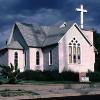 Groups Monitor Anti-Gay Church Voter Campaigns
Groups Monitor Anti-Gay Church Voter Campaigns| Posted: July 25, 2004 12:01 am ET |
(Overland Park, Kansas) A recent Sunday
found Tina Kolm changing her morning routine. Instead of attending a Unitarian
Universalist service, she was at the Lenexa Christian Center, paying close
attention to a conservative minister's sermon about the importance of amending
the U.S. Constitution to ban gay marriage.
Kolm is one of about 100 volunteers for the Mainstream Coalition, a group
monitoring the political activities of local pastors and churches. The
coalition, based in suburban Kansas City, says it wants to make sure clergy
adhere to federal tax guidelines restricting political activity by nonprofit
groups, and it's taking such efforts to a new level.
The 47-year-old Kolm, from Prairie Village, said keeping church and state
separate is important to her. She doesn't want a few religious denominations
defining marriage -- or setting other social policy -- for everyone.
"What it's all about to me is denying some people's rights," she said.
But some local clergy think the Mainstream Coalition is using scare tactics
designed to unfairly keep them out the political process.
"Somebody is trying to act like Big Brother when there's no need for Big
Brother," said the Rev. James Conard, assistant pastor at the First Baptist
Church of Shawnee. "It's obviously an intent to intimidate."
Kansas isn't the only place in this election year where church-state separation
has become a hot issue, but the Mainstream Coalition's efforts are more intense
than most.
Americans United for Separation of Church and State filed a complaint this month
with the Internal Revenue Service against the Rev. Jerry Falwell over a column
endorsing President Bush on his ministries' Web site. Falwell said the group was
waging a "scare-the-churches campaign."
Barry Lynn, executive director of Americans United, said local chapters have
sent volunteers to church services the Sunday before an election, but he said
the Mainstream Coalition's efforts are more sustained.
"To my knowledge, there's no other state organization doing what the
Mainstream Coalition is doing," said Lynn, himself a United Church of
Christ minister.
Some conservatives are upset.
"These people will stop at nothing to silence churches," said Andrea
Lafferty, executive values of the Washington-based Traditional Values Coalition,
which says it represents 43,000 churches.
The catalyst for the Mainstream Coalition's campaign in Kansas was the debate
over gay marriage.
In May, the Kansas House rejected a proposed amendment to the state constitution
to ban gay marriage. Dozens of pastors then joined a statewide effort to
register 100,000 new voters and elect more sympathetic candidates -- a move
similar to one in Washington state, where an Assembly of God pastor is leading
an effort to register 60,000 new voters and re-elect Bush.
Charles Haynes, a senior scholar with the nonpartisan First Amendment Center in
Arlington, Va., said Mainstream's tactics only added to the tension in Kansas.
"If we want to escalate a cultural war, this is a good way to do it,"
he said.
But Mainstream's executive director, Caroline McKnight, said her organization is
only trying to make sure that churches follow federal law. The group has not yet
filed any complaints, she said.
According to IRS guidelines, churches cannot endorse individual candidates, and
their pastors cannot use the pulpit or church newsletters to do so.
Churches can compile voters guides -- though such guides are supposed to be
unbiased. Pastors can preach on issues and, as individuals, endorse candidates.
McKnight said her group was reacting to pastors being public --
"brazen," in her words -- about political activity.
McKnight said the IRS does not have the resources to monitor churches'
activities, something an agency official confirmed during a recent seminar on
political activity by nonprofit groups.
Lynn said complaints to the IRS are uncommon, though his group has filed 50
during the past decade. He said 19 of those complaints involved improper
endorsements of Democratic candidates.
McKnight said Mainstream Coalition volunteers visit houses of worship of all
types. But conservative groups don't take such assurances at face value.
Said Jay Sekulow, chief counsel for the conservative American Center for Law and
Justice, of Virginia Beach, Va.: "Who deputized this group and its members
to be thought police in Kansas -- or elsewhere?"